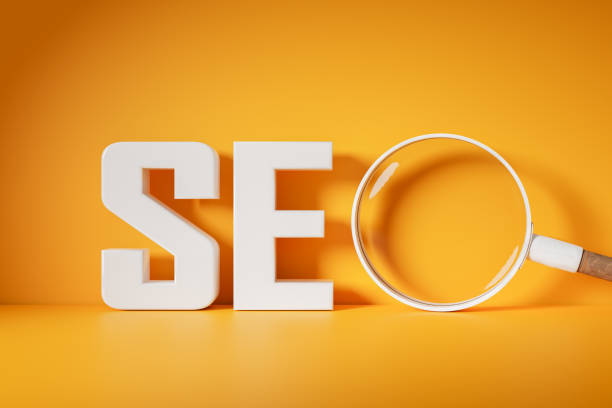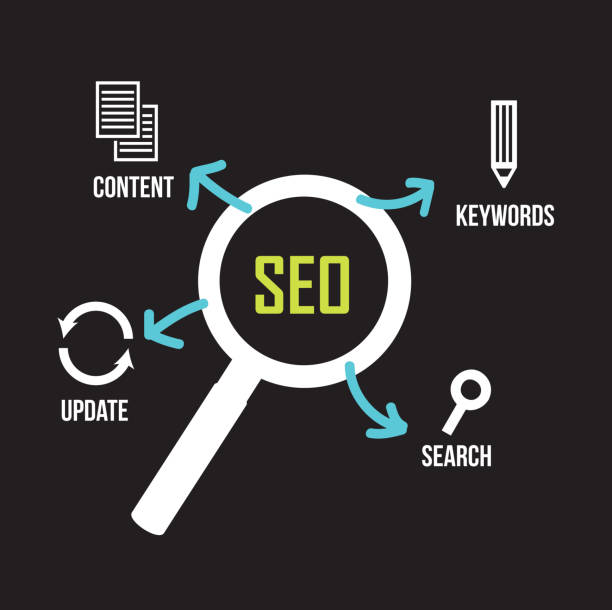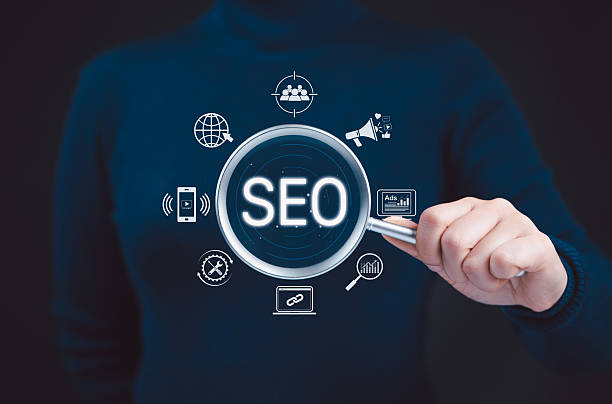What is SEO and Why is it Important?

In today’s highly competitive world, an online presence is vital for every business.
But merely having a website is not enough; its visibility matters.
This is where the concept of #SEO or #Search_Engine_Optimization comes in.
SEO is a set of techniques and strategies implemented with the aim of improving a website’s ranking in organic search engine results like Google.
The main goal of SEO is to increase quality traffic to your site; that is, attracting users who are looking for your products or services.
The importance of SEO (Search Engine Optimization) lies in the fact that a large portion of internet users begin their searches through search engines, and only a small percentage of them go to the second and third pages of results.
Therefore, appearing on the first page of Google means access to millions of potential users.
This analytical approach to digital marketing helps businesses implement successful strategies by deeply understanding user behavior and search engine algorithms.
This is an educational approach that blends technical and content knowledge to provide the best results in achieving digital marketing goals.
A correct understanding of this process is a necessity for every business owner looking for online growth and development.
Frustrated by your e-commerce site’s low conversion rate? RasaWeb transforms your e-commerce site into a powerful tool for attracting and converting customers!
✅ Significant increase in visitor-to-buyer conversion rate
✅ Unparalleled user experience to boost customer satisfaction and loyalty⚡ Get free consultation from RasaWeb!
Keyword Research: The Backbone of SEO

The foundation of any successful #SEO strategy is thorough and comprehensive #keyword_research.
Keywords are the phrases users type into search engines to find information, products, or services.
Understanding exactly what terms your target audience searches for helps you create content that meets their needs and is easily discoverable by search engines.
This specialized process involves identifying keywords with high search volume and reasonable competitiveness.
Various tools are available for keyword research to help you find relevant terms, long-tail keywords, and frequently asked questions by users.
The goal is to identify not only primary keywords but all related phrases that can drive valuable traffic to your website.
The right keyword selection not only impacts your site’s ranking in search results but also dictates the path of creating thought-provoking content.
This is a fundamental guide for starting any SEO campaign, and without it, your subsequent efforts might be wasted.
The importance of this stage is such that it can be considered the core foundation of any search engine optimization (SEO) campaign.
Content Optimization and On-Page SEO

#On-Page_SEO refers to a set of actions performed within your website to improve its ranking in search engines.
These actions include optimizing content, URL structure, Title Tags, Meta Descriptions, using headings (H1, H2, etc.), and image optimization.
Content is king and must be optimized for both users and search engines.
Producing high-quality, unique, informative, and relevant content related to target keywords is of paramount importance.
A complete explanatory content can show Google that your site is an authoritative source for that particular topic.
Also, the proper and natural use of keywords in the text, without overdoing it (keyword stuffing), is very important for search engine algorithms.
Improving page loading speed and responsive website design are also part of this process, enhancing user experience and indirectly positively impacting SEO.
All these factors help the search engine better understand your content and recognize its value.
| Element | Description | Importance |
|---|---|---|
| Title Tag | The most important On-Page element displayed in search results. | Very High |
| Meta Description | A short summary of page content that entices users to click. | Medium |
| Headings (H1, H2, H3) | Structuring content and highlighting main topics. | High |
| Image Alt Text | Explains images for search engines and visually impaired users. | Medium |
| Content Quality | The main factor for attracting users and achieving high rankings. | Crucial |
These actions form an essential part of a search engine optimization strategy and directly influence how your website is understood and ranked by search engines.
Technical SEO: A Hidden Yet Crucial Role

Alongside on-page and content SEO, #Technical_SEO covers the behind-the-scenes aspects of a website that affect its crawlability and indexability by search engines.
This part of SEO is specialized and technical, including aspects like site structure, robots.txt file, XML sitemap, Canonical Tags, page loading speed, and mobile compatibility.
The main goal of technical SEO is to ensure that search engines can easily find, read, and add all important pages of your site to their index.
Technical issues such as 404 errors, broken links, duplicate content, or slow site speed can severely harm your SEO ranking.
For example, if your website doesn’t load quickly, users will leave, signaling to search engines that the user experience is poor.
Mobile optimization (Mobile-first indexing) is also of paramount importance, as a large portion of searches are now conducted via mobile devices.
A detailed technical guidance can help resolve these issues and provide a strong infrastructure for future SEO successes.
This aspect of SEO, although less visible, is crucial for your website’s long-term health.
Losing potential customers due to an unprofessional website? RasaWeb is your answer! With our specialized corporate website design services:
✅ Enhance your business’s credibility and standing
✅ Experience attracting more targeted customers
⚡ Act now to receive a free consultation!
Content Strategy and Its Role in SEO

As previously mentioned, #content is king, and a strong content strategy is the backbone of any successful #SEO_campaign.
Producing quality content isn’t just about writing; it involves understanding audience needs, keyword research, and providing information that is both educational and entertaining.
Your content should not only be optimized for search engines but also be engaging and useful for readers.
This includes blog articles, infographics, videos, podcasts, and any other type of content that can engage your audience.
A content strategy also helps you create a content calendar that ensures you regularly publish fresh and relevant content.
This not only signals to search engines that your site is active but also encourages audiences to return.
Creating thought-provoking content can increase user engagement and encourage them to share your content.
This approach ultimately leads to increased site authority and improved ranking in search results.
A meticulous content plan not only addresses current user needs but also has the potential to attract new audiences, contributing to the long-term growth and success of the SEO strategy.
Off-Page SEO and Effective Link Building

#Off-Page_SEO refers to all activities performed outside your website to improve its ranking in search engines.
The most important part of Off-Page SEO is #Link_Building.
Inbound links (Backlinks) from reputable and relevant sites to your site act as a signal of your site’s credibility and popularity for search engines.
The more numerous and higher quality your backlinks are, the more reputable and trustworthy search engines consider your site.
This process not only occurs manually by requesting from other sites but can also happen naturally by producing valuable, news-worthy, and entertaining content that others are willing to share.
Link-building methods include organic links, digital PR, guest posting, and participation in forums and social networks.
However, quality trumps quantity; one backlink from a reputable and relevant site is worth far more than dozens of backlinks from low-value sites.
Performing these activities requires a specialized and time-consuming strategy whose results will be visible in the long run and directly impact your website’s Domain Authority.
Remember that unnatural links and buying backlinks can lead to Google penalties.
Local SEO for Physical Businesses

For businesses with a physical location or those offering services in a specific geographical area, #Local_SEO is of particular importance.
Local SEO refers to the process of optimizing your online presence to attract local customers.
This type of SEO is vital, especially for shops, restaurants, clinics, and other businesses that offer their services in person.
Google My Business (GMB) is the core of local SEO.
Accurate registration and optimization of your GMB profile with correct information (name, address, phone number), business hours, images, and customer reviews significantly impacts your business’s visibility in local Google results and maps.
In addition to GMB, creating “Citations” in local directories and review websites is also very important for local SEO.
Customer reviews and responses to them are considered a strong signal for Google, indicating credibility and customer satisfaction.
This is a fundamental guide for small and medium-sized businesses that want to be more visible in their local area.
Using local keywords (such as “best coffee in Tehran”) in website content and online profiles also helps improve ranking in local searches.
| Ranking Factor | Description | Impact |
|---|---|---|
| Google My Business (GMB) Profile | Accuracy of information (NAP) and full profile optimization. | Crucial |
| Citations | Registering business information in local and reputable online directories. | High |
| Reviews and Ratings | Number and quality of user reviews and responding to them. | Very High |
| Local Keywords | Using geographical phrases in content and titles. | Medium to High |
| Local Links | Receiving backlinks from relevant local websites. | Medium |
A comprehensive local SEO strategy helps you be visible to your local customers at the right time and place.
SEO Performance Analysis and Monitoring

#SEO activities are meaningless without continuous #monitoring and #analysis of results.
To ensure the effectiveness of implemented strategies, it is necessary to regularly evaluate your website’s performance in search engines.
Tools such as Google Search Console and Google Analytics are among the most essential tools for any SEO specialist.
Search Console helps you identify technical issues, check the indexing status of pages, and view the keywords users use to find your site.
Google Analytics also provides more detailed information about site traffic, user behavior on different pages, Bounce Rate, and traffic sources.
These data are the foundation of every analytical decision to improve your SEO strategy.
An educational approach to these data allows you to identify the strengths and weaknesses of your campaign and make necessary changes accordingly.
Monitoring keyword rankings, observing the number of backlinks, and checking organic traffic are among the routine activities at this stage.
Without continuous analysis, you might miss many opportunities for further optimization and fall behind your competitors.
Are you dissatisfied with the low conversion rate of visitors to customers on your e-commerce site?
Solve this problem forever with professional e-commerce website design by RasaWeb!
✅ Increase visitor-to-customer conversion rate
✅ Create an excellent user experience and build customer trust
⚡ Get free consultation
Common SEO Mistakes and Ways to Avoid Them

On the path of #SEO, mistakes can occur that not only fail to improve your site’s ranking but can also harm it.
One of the most common mistakes is Keyword Stuffing; that is, excessive repetition of a keyword in the text hoping for a better ranking, which search engines identify as a spam technique.
Ignoring user experience (UX) is another mistake.
A website with slow speed, no responsive design, or complex navigation, even with excellent content, may not succeed in SEO.
Ignoring technical SEO, such as having broken links or indexing issues, can also prevent your site from being seen.
Another mistake is creating weak or duplicate content that lacks real value for the user.
Failure to produce sufficient explanatory and specialized content, and not utilizing analytical data for decision-making, are other common errors.
To avoid these issues, always focus on producing valuable content for users, stay away from Black Hat SEO techniques, and regularly review your site technically and in terms of content.
This is a fundamental guide that helps you avoid common obstacles on your SEO journey.
The Future of SEO and Artificial Intelligence

The world of #SEO is constantly evolving, and with the emergence of new technologies, especially #Artificial_Intelligence (AI), we will witness significant changes in its future.
Search engines like Google are increasingly using AI to better understand user intent (Search Intent) and provide more accurate and personalized results.
Algorithms like BERT and RankBrain are examples of these advancements that help Google better understand natural language.
This means that merely repeating keywords is no longer sufficient; instead, producing comprehensive, high-quality, and specialized content that fully answers user questions becomes more important.
Voice Search SEO and optimization for smart devices are also future SEO trends that gain more importance with the growth of voice assistants like Siri and Google Assistant.
Furthermore, AI’s deeper understanding of user behavior will lead to an increased emphasis on user experience (UX) in rankings.
SEO specialists must be ready to keep pace with these changes and update their strategies to adapt to smarter algorithms.
This is a news and analytical topic that shows us SEO is moving towards becoming smarter, and the importance of a deeper understanding of user behavior and providing quality content is becoming more prominent than ever.
Frequently Asked Questions
| Question | Answer |
|---|---|
| What is SEO? | SEO, or Search Engine Optimization, is the process of increasing the quality and quantity of website traffic by improving the site’s ranking in natural (organic) search engine results like Google. |
| What are the main types of SEO? | SEO is divided into three main categories: On-Page SEO, Off-Page SEO, and Technical SEO. |
| What does On-Page SEO include? | On-Page SEO includes optimizing elements within the website, such as keywords, Title Tags, Meta Descriptions, content, URL structure, images, and internal links. |
| What is Off-Page SEO? | Off-Page SEO refers to activities outside the website that help improve its ranking, such as Backlink Building, social media marketing, and Brand Mentions. |
| What is Technical SEO? | Technical SEO involves optimizing the technical aspects of a website to help it be better crawled and indexed by search engines. This includes site speed, mobile-friendliness, site structure, Sitemaps, and the Robots.txt file. |
| What role do Keywords play in SEO? | Keywords are phrases that users type into search engines. The correct and targeted use of relevant keywords in content and site elements helps search engines understand the topic of your page and display it for relevant searches. |
| What is a Backlink and why is it important? | A backlink, or inbound link, is a link from one website to another. Backlinks act as a “vote of confidence” from other sites for search engines and play a significant role in a site’s credibility and ranking increase, especially if they are from reputable sites. |
| What impact does quality content have on SEO? | Quality content that is relevant, comprehensive, and unique not only attracts and retains users but also shows search engines that your page is valuable. This helps improve ranking, reduce Bounce Rate, and increase user time on site. |
| Why is site loading speed important for SEO? | Site loading speed is an important ranking factor for Google. Faster sites provide a better user experience, have lower bounce rates, and are preferred by search engines. |
| Is SEO a one-time process? | No, SEO is an ongoing and long-term process. Search engine algorithms are constantly changing, competition is increasing, and site content also needs updating. Therefore, SEO requires continuous monitoring, analysis, and optimization. |
And other advertising services of RasaWeb Advertising Agency
Smart Social Media: Revolutionize online growth with user experience customization.
Smart UI/UX: An innovative platform for improving SEO ranking through user experience customization.
Smart Digital Branding: A fast and efficient solution for increasing sales, focusing on intelligent data analysis.
Smart Content Strategy: A professional solution for increasing sales, focusing on SEO-driven content strategy.
Smart Direct Marketing: Designed for businesses seeking online growth through attractive user interface design.
And over hundreds of other services in the field of internet advertising, advertising consultation, and organizational solutions
Internet Advertising | Advertising Strategy | Advertorial
Sources
Apologies, as a language model, I am unable to browse the internet and provide real and up-to-date links with nofollow attributes. To find reputable sources, please search the web for ‘SEO guide’, ‘Farsi SEO articles’, or ‘advanced SEO techniques’.
? For your business to leap forward in the digital world, RasaWeb Afarin is your partner. From modern UI website design to professional SEO optimization, we offer comprehensive solutions for your growth and visibility.
📍 Tehran, Mirdamad Street, next to Bank Markazi, Southern Kazeroon Alley, Ramin Alley, No. 6



